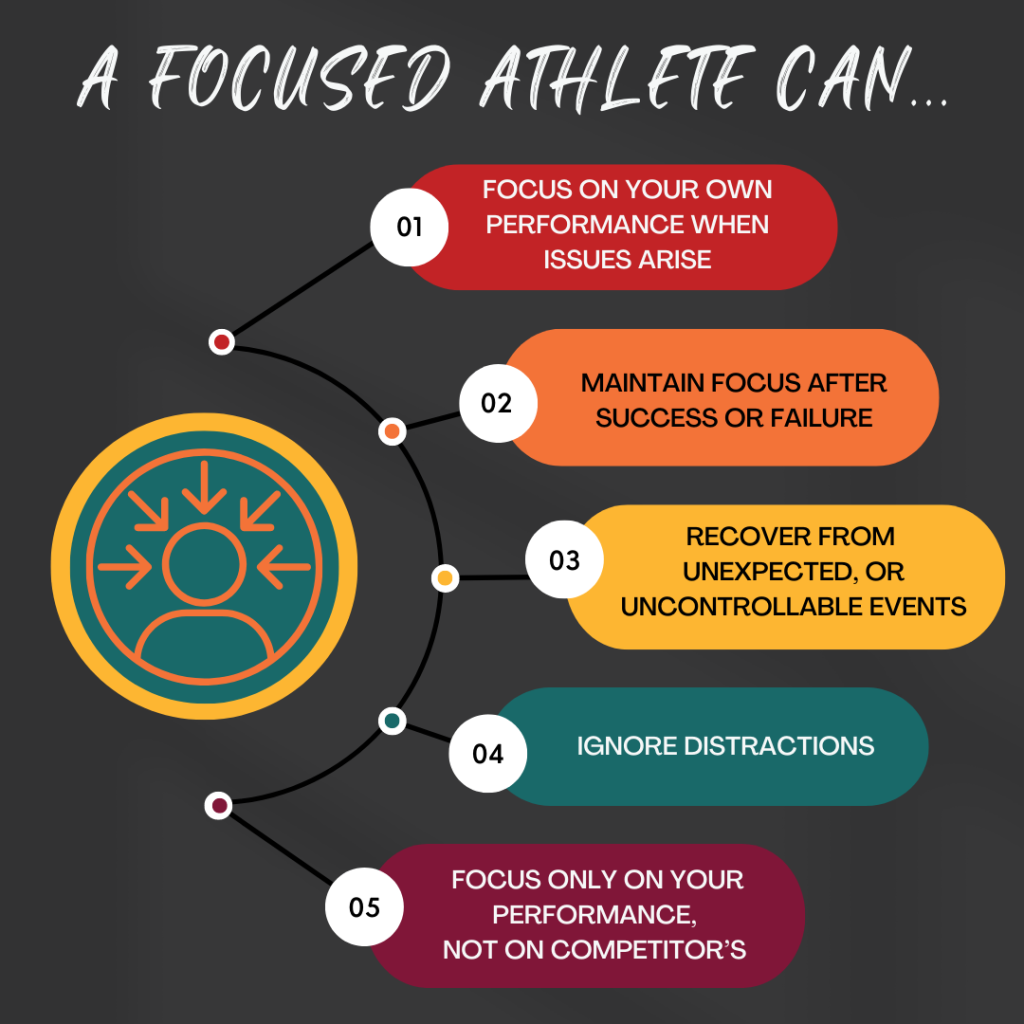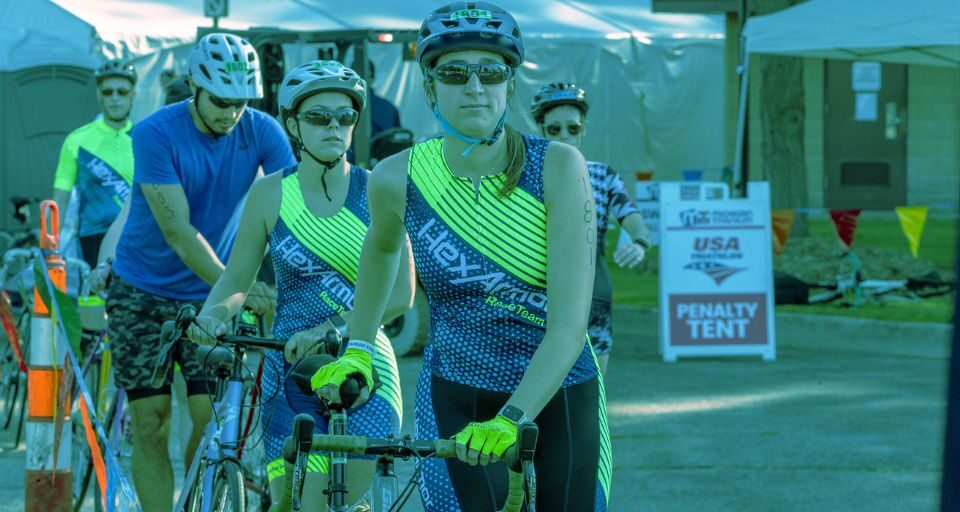How many times have you heard a coach tell an athlete to focus? I can picture myself up to bat as a kid, and hearing those words from my coach. I often use it when instructing strength training clients too. ” Focus” may just be the most overused term in sports, but there’s a reason it’s so frequently encouraged. It’s that important.
What does it mean for an endurance athlete to “focus”?
Focus can be obvious, such as “keep your eye on the ball” or being focused on your goals. But, when it comes to training and racing, focus for an endurance athlete is much more abstract. A focused athlete has a competitive advantage because they have learned to control their emotions and actions, keeping their attention solely on their performance. Here are some attributes of a focused endurance athlete:

Concentration is the ability to maintain focus over time. Did you know that we only maintain a unique thought for an average of 5 seconds? And that we are bombarded with over 4,000 original thoughts per day! That can make concentration extremely difficult.
For many sports, concentration is only required in short doses, but for endurance athletes, concentration can be required for hours.
The mentally tough marathoner, triathlete, cyclist or distance swimmer has mastered the ability to focus on only the important aspects of their performance and to maintain their focus over time and shifting when necessary. Focused athletes have figured out how to disregard obtrusive thoughts and maintain concentration.
Genetics and environment can play a role in the ability to focus. But, it’s also a skill you can develop and nurture. Here are a few tips for building your ability to focus.

TIP #1: Find balance in your training
Think of two different runners. Runner A is acutely aware of their heart rate zones, breathing patterns, muscle tension and form. This athlete practices associative strategies of focus. Runner B runs with friends, no watch, listens to music, and zones out to enjoy the scenery. This person uses dissociative strategies of focus.
Researchers have found that both of these training strategies are important for different reasons.
Associative focus teaches awareness of how our body feels and performs. When needed, this allows us to push through physical discomfort as you have developed strong body awareness and have prepared for the discomfort. This strategy is associated with higher levels of performance.
Disassociation is important because it can decrease the drudgery of exercise and make it more fun.
The mentally tough athlete practices a balance between disassociation and association in their training. All social training (disassociative) can make race day really lonely! Plus, it’s important to experience hell in training (associative) so we know on race day that we can get through it! Conversely, too much hyper-focus on your own performance and metrics can lead to stress fatigue over time.
TIP #2: Be present: focus on the mile you are in
There are two very irrelevant areas of thought when you’re in the middle of a training session or race – the past and the future.
Have you ever been 10 minutes into a workout when your mind wanders to some poor nutrition choices (or some other negative factor that you cannot fix at that moment)? You then ruminate on how you will never become the machine you dream to be because you can’t perfect your nutrition. “What was I thinking eating that whole bag of trail mix?” (true story!) Next thing you know, your workout is far from the intensity it needs to be or maybe you even quit because you’re discouraged. This is negative talk focused on the past.
Future negative thoughts might sound like, “I’ll never be able to go that far!” Or, how will I ever be strong enough to do this?” “What if so-and-so performs better than me?”
Both are distractions from the objectives of your workout. Instead, focus on the mile you are in. Stay present by first recognizing that the negative thoughts invading your head are completely out of your control. Bring yourself back to the present moment by using either the associative or dissociative strategies mentioned above.
TIP #3 Talk yourself up: self-talk or a mantra will help you focus
My mind is a relentless chatterbox. Controlling my self-talk is very important so I don’t zone out or get lost in fear of the what-ifs.
Self-talk is more than the inner dialogue that runs through your head. It’s the stuff you say about yourself.
-
Negative, critical self-defeating talk, which we already discussed and will not do!
-
Neutral self talk is not positive or negative, just objective and factual. For example, “I’m doing the best I can” “Feelings are not facts”.
- Positive self-talk is motivational. It’s your inner cheerleader. Its sounds like, “you got this” “Almost there” or “Trust your training”. Those short simple phrases help get us through. They are important for increasing motivation for extended efforts and keeping our brains in the game.
-
Keep your phrases short and specific
-
Use the second or third person, and present tense
- Say your phrases with meaning and attention
-
Speak kindly to yourself
-
Repeat phrases often (yes, in training too!)
- Start with neutral phrases if you’re uncomfortable with positive ones.
Tip #4 Create a Routine
You wake up, get a drink of water, pour the coffee, use the restroom, turn on the TV, and check your phone. This is an example of a mundane routine, but it’s our habit and we don’t even have to think about doing it. We all have routines, and establishing routines for the important parts of our workouts can help us keep our focus as well. You don’t have to be distracted wondering if there’s enough air in your tires if checking your tires is always part of your pre-ride routine.
Routines help us to feel in control. Being in control helps us focus.
Think about a golfer, they have a mental and physical routine they follow every time they step up to hit the ball. Having a routine such as this has been proven to improve physical performance and focus.
A short routine can help us through challenging but expected situations. For example, an athlete prone to panic attacks in open water might establish this routine; when I feel a sense of panic in the open water, I switch to a side stroke and take three deep breaths, remind myself that I am okay, and return to my freestyle stroke.
Tip #5 Make a Plan
One of the most critical factors in reducing injuries and having a successful training season is consistency. And the absolute best way to be consistent is to follow a plan that fits your life and your fitness goals.
Following your plan, checking off those boxes every day and seeing yourself progressively grow stronger is a huge confidence booster, particularly when race day rolls around. Ben and I often tell our Iron distance athletes on race day, “you’ve done this hundreds of times in training. Race day is just executing the plan that we have been practicing for months.”
Allow your plan to be fluid, and make sure it progressively challenges you over time. Your plan can be detailed or simple, whatever suits your personality best. Having your plan in place will ensure that you wake up each morning knowing what you need to accomplish that day in order to get you to your goal 6 months down the road. Eliminating uncertainty and being prepared will definitely boost your mental toughness and help you maintain focus in the present.
Content References: National Academy of Sports Medicine (2014) Mental Toughness, Concentration and Attentional Focus





